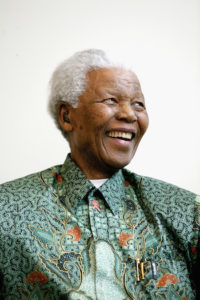
Nelson Mandela
*Nelson Mandela was born on this date in 1918. He was a Black South African activist and leader who played a crucial role in ending Apartheid.
Born in Umtata, South Africa, in what is now Eastern Cape Province, Nelson Rolihlahla Mandela was the son of a Xhosa-speaking Thembu chief. He attended the University of Fort Hare in Alice, where he became involved in the political struggle against racial discrimination in South Africa. He was expelled in 1940 for participating in a student demonstration. After moving to Johannesburg, he completed his coursework by correspondence through the University of South Africa and received a bachelor’s degree in 1942. Mandela then studied law at the University of Witwatersrand in Johannesburg.
He became increasingly involved with the African National Congress (ANC), a multiracial nationalist movement that sought to bring about democratic political change in South Africa. Mandela helped establish the ANC’s Youth League in 1944 and became its president in 1951. The National Party (NP) came to power in South Africa in 1948 on a political platform of white supremacy. The official policy of Apartheid, or forced segregation of the races, began to be implemented under NP rule. In 1952, the ANC staged a campaign known as the Defiance Campaign, when protesters across the country refused to obey apartheid laws. That same year, Mandela became one of the four deputy presidents of the ANC.
In 1952, he and his friend Oliver Tambo became the first Blacks to open a law practice in South Africa. In the face of government harassment and the prospect of the ANC being officially banned, Mandela and others devised a plan. After Mandela, the "M" plan organized the ANC into small units of people who could encourage grassroots participation in anti-apartheid struggles.
By the late 1950s, Mandela, with Oliver Tambo and others, moved the ANC in a more militant direction against the increasingly discriminatory policies of the government. He was charged with treason in 1956 due to the ANC’s increased activity, particularly during the Defiance Campaign, but he was acquitted after a five-year trial. In 1957, Mandela divorced his first wife, Evelyn Mase; in 1958, he married Nkosikazi Nomzamo Madikizela, a social worker who became known as Winnie Mandela. In March 1960, the ANC and its rival, the Pan-Africanist Congress (PAC), called for a nationwide demonstration against South Africa’s Pass laws, which controlled the movement and employment of Blacks and forced them to carry identity papers.
When police massacred 69 blacks demonstrating in Sharpeville, both the ANC and the PAC were banned. After Sharpeville, the ANC abandoned its strategy of nonviolence, which had been a key part of its philosophy until then. Mandela helped to establish the ANC’s military wing, Umkhonto we Sizwe (Spear of the Nation), in December 1961. He was named the commander-in-chief and went to Algeria for military training.
In August 1962, he was arrested in South Africa and sentenced to Robben Island prison for incitement and leaving the country illegally. In response to international and domestic pressure, the South African government, under the leadership of President F. W. de Klerk lifted the ban against the ANC and released Mandela in February 1990 after 28 years in prison.
Soon after his release from prison, he became estranged from Winnie Mandela, who had played a key leadership role in the anti-apartheid movement during his incarceration. Although Winnie had won international recognition for her defiance of the government, immediately before Mandela’s release, she had come into conflict with the ANC over a controversial kidnapping and murder trial that involved her young bodyguards. The Mandelas were divorced in 1996.
Mandela, who enjoyed enormous popularity, assumed the leadership of the ANC and led negotiations with the government to end Apartheid. While white South Africans considered sharing power a big step, Black South Africans wanted nothing less than a complete transfer of power. Mandela played a crucial role in resolving differences. He and de Klerk were awarded the Nobel Peace Prize in 1993 for their efforts.
The following year, South Africa held its first multiracial elections, and Mandela became president. Mandela sought to calm the fears of white South Africans and potential international investors by striking a balance between plans for reconstruction and development and financial caution. His Reconstruction and Development Plan allocated substantial funds to create jobs, housing, and develop basic healthcare. In December 1996, Mandela signed into law a new South African constitution. The constitution established a federal system with a strong central government based on majority rule, and it contained guarantees of the rights of minorities and freedom of expression.
Mandela became the oldest elected President of South Africa when he took office at the age of 77 in 1994. He retired in 1999 to be succeeded by Thabo Mbeki as party leader of the ANC.
After his retirement as President, Mandela went on to become an advocate for various social and human rights organizations. He has expressed his support for the international Make Poverty History movement, of which the ONE Campaign is a part. Since his retirement, one of Mandela's primary commitments has been to the fight against AIDS.
Mandela's 90th birthday was celebrated across the country on July 18, 2008, with the main celebrations held in his hometown of Qunu. A concert in his honor was also held in Hyde Park, London. In a speech marking his birthday, Mandela called for the wealthy to help the poor worldwide. The former South African President Nelson Mandela, the first Black president of South Africa and a 1993 Nobel Peace Prize winner, died on December 5, 2013, at age 95, of complications from a recurring lung infection.